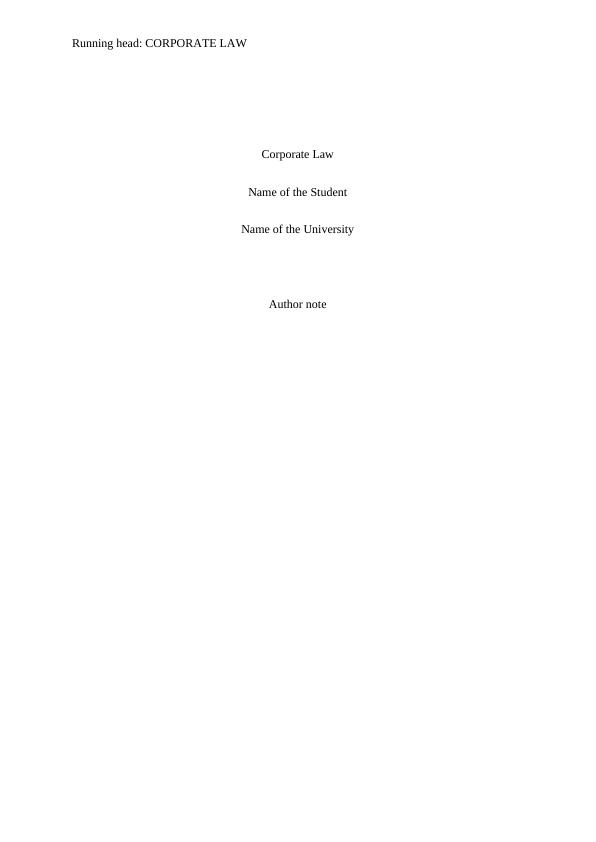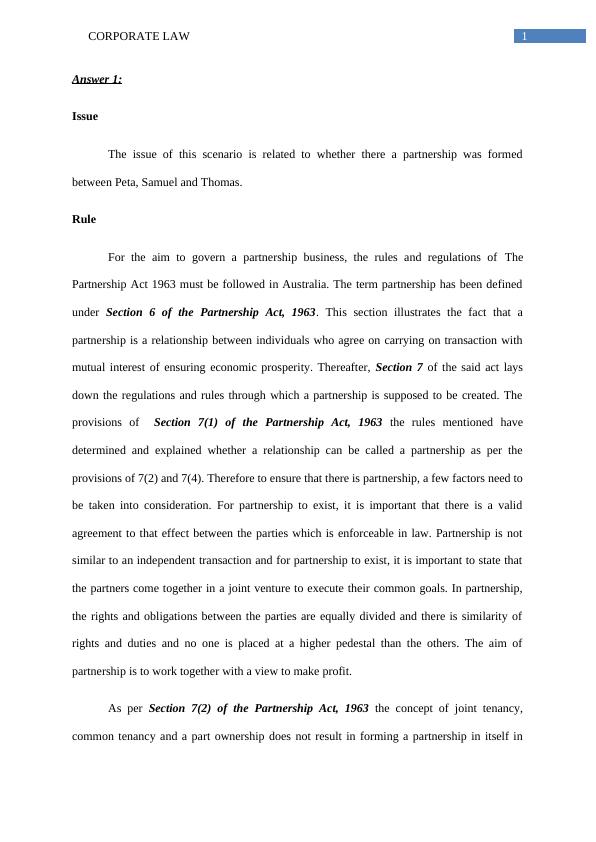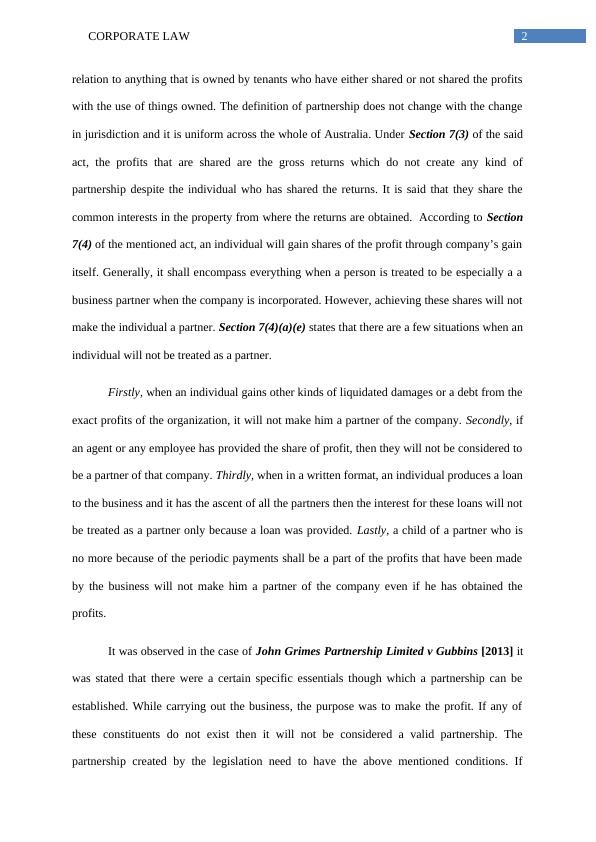Corporate Law: Partnership Formation and Director's Duties
Added on 2023-06-12
8 Pages2293 Words470 Views
Running head: CORPORATE LAW
Corporate Law
Name of the Student
Name of the University
Author note
Corporate Law
Name of the Student
Name of the University
Author note

1CORPORATE LAW
Answer 1:
Issue
The issue of this scenario is related to whether there a partnership was formed
between Peta, Samuel and Thomas.
Rule
For the aim to govern a partnership business, the rules and regulations of The
Partnership Act 1963 must be followed in Australia. The term partnership has been defined
under Section 6 of the Partnership Act, 1963. This section illustrates the fact that a
partnership is a relationship between individuals who agree on carrying on transaction with
mutual interest of ensuring economic prosperity. Thereafter, Section 7 of the said act lays
down the regulations and rules through which a partnership is supposed to be created. The
provisions of Section 7(1) of the Partnership Act, 1963 the rules mentioned have
determined and explained whether a relationship can be called a partnership as per the
provisions of 7(2) and 7(4). Therefore to ensure that there is partnership, a few factors need to
be taken into consideration. For partnership to exist, it is important that there is a valid
agreement to that effect between the parties which is enforceable in law. Partnership is not
similar to an independent transaction and for partnership to exist, it is important to state that
the partners come together in a joint venture to execute their common goals. In partnership,
the rights and obligations between the parties are equally divided and there is similarity of
rights and duties and no one is placed at a higher pedestal than the others. The aim of
partnership is to work together with a view to make profit.
As per Section 7(2) of the Partnership Act, 1963 the concept of joint tenancy,
common tenancy and a part ownership does not result in forming a partnership in itself in
Answer 1:
Issue
The issue of this scenario is related to whether there a partnership was formed
between Peta, Samuel and Thomas.
Rule
For the aim to govern a partnership business, the rules and regulations of The
Partnership Act 1963 must be followed in Australia. The term partnership has been defined
under Section 6 of the Partnership Act, 1963. This section illustrates the fact that a
partnership is a relationship between individuals who agree on carrying on transaction with
mutual interest of ensuring economic prosperity. Thereafter, Section 7 of the said act lays
down the regulations and rules through which a partnership is supposed to be created. The
provisions of Section 7(1) of the Partnership Act, 1963 the rules mentioned have
determined and explained whether a relationship can be called a partnership as per the
provisions of 7(2) and 7(4). Therefore to ensure that there is partnership, a few factors need to
be taken into consideration. For partnership to exist, it is important that there is a valid
agreement to that effect between the parties which is enforceable in law. Partnership is not
similar to an independent transaction and for partnership to exist, it is important to state that
the partners come together in a joint venture to execute their common goals. In partnership,
the rights and obligations between the parties are equally divided and there is similarity of
rights and duties and no one is placed at a higher pedestal than the others. The aim of
partnership is to work together with a view to make profit.
As per Section 7(2) of the Partnership Act, 1963 the concept of joint tenancy,
common tenancy and a part ownership does not result in forming a partnership in itself in

2CORPORATE LAW
relation to anything that is owned by tenants who have either shared or not shared the profits
with the use of things owned. The definition of partnership does not change with the change
in jurisdiction and it is uniform across the whole of Australia. Under Section 7(3) of the said
act, the profits that are shared are the gross returns which do not create any kind of
partnership despite the individual who has shared the returns. It is said that they share the
common interests in the property from where the returns are obtained. According to Section
7(4) of the mentioned act, an individual will gain shares of the profit through company’s gain
itself. Generally, it shall encompass everything when a person is treated to be especially a a
business partner when the company is incorporated. However, achieving these shares will not
make the individual a partner. Section 7(4)(a)(e) states that there are a few situations when an
individual will not be treated as a partner.
Firstly, when an individual gains other kinds of liquidated damages or a debt from the
exact profits of the organization, it will not make him a partner of the company. Secondly, if
an agent or any employee has provided the share of profit, then they will not be considered to
be a partner of that company. Thirdly, when in a written format, an individual produces a loan
to the business and it has the ascent of all the partners then the interest for these loans will not
be treated as a partner only because a loan was provided. Lastly, a child of a partner who is
no more because of the periodic payments shall be a part of the profits that have been made
by the business will not make him a partner of the company even if he has obtained the
profits.
It was observed in the case of John Grimes Partnership Limited v Gubbins [2013] it
was stated that there were a certain specific essentials though which a partnership can be
established. While carrying out the business, the purpose was to make the profit. If any of
these constituents do not exist then it will not be considered a valid partnership. The
partnership created by the legislation need to have the above mentioned conditions. If
relation to anything that is owned by tenants who have either shared or not shared the profits
with the use of things owned. The definition of partnership does not change with the change
in jurisdiction and it is uniform across the whole of Australia. Under Section 7(3) of the said
act, the profits that are shared are the gross returns which do not create any kind of
partnership despite the individual who has shared the returns. It is said that they share the
common interests in the property from where the returns are obtained. According to Section
7(4) of the mentioned act, an individual will gain shares of the profit through company’s gain
itself. Generally, it shall encompass everything when a person is treated to be especially a a
business partner when the company is incorporated. However, achieving these shares will not
make the individual a partner. Section 7(4)(a)(e) states that there are a few situations when an
individual will not be treated as a partner.
Firstly, when an individual gains other kinds of liquidated damages or a debt from the
exact profits of the organization, it will not make him a partner of the company. Secondly, if
an agent or any employee has provided the share of profit, then they will not be considered to
be a partner of that company. Thirdly, when in a written format, an individual produces a loan
to the business and it has the ascent of all the partners then the interest for these loans will not
be treated as a partner only because a loan was provided. Lastly, a child of a partner who is
no more because of the periodic payments shall be a part of the profits that have been made
by the business will not make him a partner of the company even if he has obtained the
profits.
It was observed in the case of John Grimes Partnership Limited v Gubbins [2013] it
was stated that there were a certain specific essentials though which a partnership can be
established. While carrying out the business, the purpose was to make the profit. If any of
these constituents do not exist then it will not be considered a valid partnership. The
partnership created by the legislation need to have the above mentioned conditions. If

End of preview
Want to access all the pages? Upload your documents or become a member.
Related Documents
Commercial and Corporation Lawlg...
|10
|2373
|125
Corporate Law: Partnership Act and Director's Duties under Corporations Actlg...
|10
|2427
|467
Business Laws - Sample Assignment PDFlg...
|8
|2302
|42
Business Laws Issue - Assignmentlg...
|9
|2236
|23
Business Lawlg...
|10
|2378
|336
Business Law Assignment : NSWlg...
|9
|2347
|40
